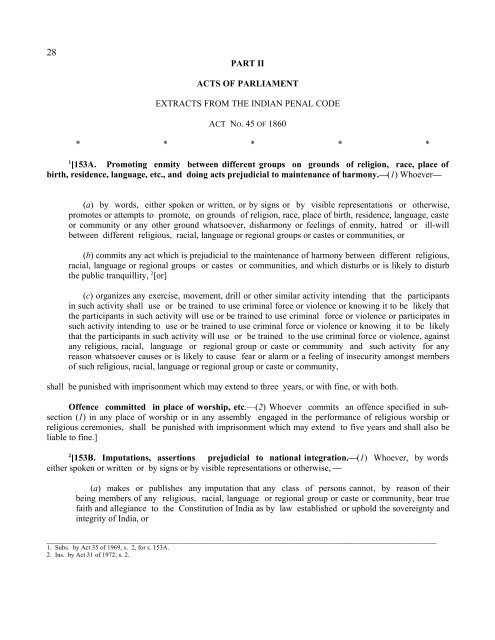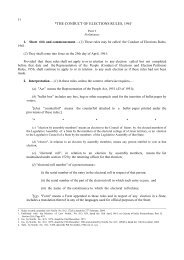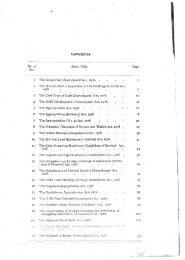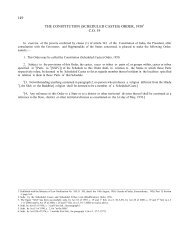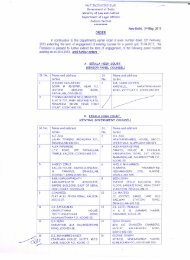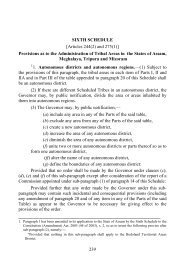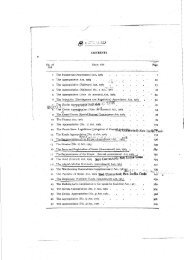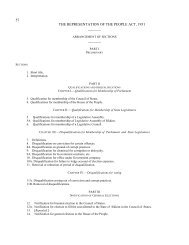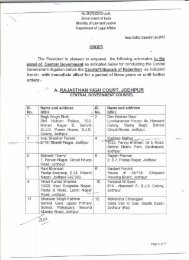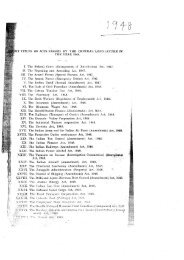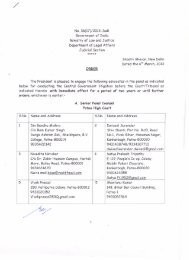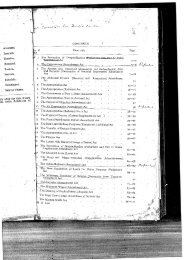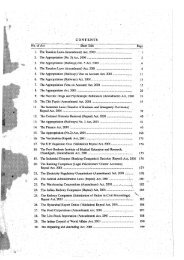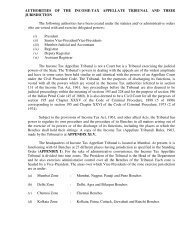Extracts from the Indian Penal Code
Extracts from the Indian Penal Code
Extracts from the Indian Penal Code
Create successful ePaper yourself
Turn your PDF publications into a flip-book with our unique Google optimized e-Paper software.
28<br />
PART II<br />
ACTS OF PARLIAMENT<br />
EXTRACTS FROM THE INDIAN PENAL CODE<br />
ACT NO. 45 OF 1860<br />
* * * * *<br />
1<br />
[153A. Promoting enmity between different groups on grounds of religion, race, place of<br />
birth, residence, language, etc., and doing acts prejudicial to maintenance of harmony.—(1) Whoever—<br />
(a) by words, ei<strong>the</strong>r spoken or written, or by signs or by visible representations or o<strong>the</strong>rwise,<br />
promotes or attempts to promote, on grounds of religion, race, place of birth, residence, language, caste<br />
or community or any o<strong>the</strong>r ground whatsoever, disharmony or feelings of enmity, hatred or ill-will<br />
between different religious, racial, language or regional groups or castes or communities, or<br />
(b) commits any act which is prejudicial to <strong>the</strong> maintenance of harmony between different religious,<br />
racial, language or regional groups or castes or communities, and which disturbs or is likely to disturb<br />
<strong>the</strong> public tranquillity, 2 [or]<br />
(c) organizes any exercise, movement, drill or o<strong>the</strong>r similar activity intending that <strong>the</strong> participants<br />
in such activity shall use or be trained to use criminal force or violence or knowing it to be likely that<br />
<strong>the</strong> participants in such activity will use or be trained to use criminal force or violence or participates in<br />
such activity intending to use or be trained to use criminal force or violence or knowing it to be likely<br />
that <strong>the</strong> participants in such activity will use or be trained to <strong>the</strong> use criminal force or violence, against<br />
any religious, racial, language or regional group or caste or community and such activity for any<br />
reason whatsoever causes or is likely to cause fear or alarm or a feeling of insecurity amongst members<br />
of such religious, racial, language or regional group or caste or community,<br />
shall be punished with imprisonment which may extend to three years, or with fine, or with both.<br />
Offence committed in place of worship, etc.—(2) Whoever commits an offence specified in subsection<br />
(1) in any place of worship or in any assembly engaged in <strong>the</strong> performance of religious worship or<br />
religious ceremonies, shall be punished with imprisonment which may extend to five years and shall also be<br />
liable to fine.]<br />
2<br />
[153B. Imputations, assertions prejudicial to national integration.—(1) Whoever, by words<br />
ei<strong>the</strong>r spoken or written or by signs or by visible representations or o<strong>the</strong>rwise, —<br />
(a) makes or publishes any imputation that any class of persons cannot, by reason of <strong>the</strong>ir<br />
being members of any religious, racial, language or regional group or caste or community, bear true<br />
faith and allegiance to <strong>the</strong> Constitution of India as by law established or uphold <strong>the</strong> sovereignty and<br />
integrity of India, or<br />
_______________________________________________________________________________________<br />
1. Subs. by Act 35 of 1969, s. 2, for s. 153A.<br />
2. Ins. by Act 31 of 1972, s. 2.
29<br />
<strong>Extracts</strong> <strong>from</strong> <strong>the</strong> <strong>Indian</strong> <strong>Penal</strong> <strong>Code</strong><br />
(PART II.—Acts of Parliament)<br />
(b) asserts, counsels, advises, propagates or publishes that any class of persons shall, by reason of <strong>the</strong>ir<br />
being members of any religious, racial, language or regional group or caste or community, be denied or deprived<br />
of <strong>the</strong>ir rights as citizens of India, or<br />
(c) makes or publishes any assertion, counsel, plea or appeal concerning <strong>the</strong> obligation of any class of<br />
persons, by reason of <strong>the</strong>ir being members of any religious, racial, language or regional group or caste or<br />
community, and such assertion, counsel, plea or appeal causes or is likely to cause disharmony or feelings of<br />
enmity or hatred or ill-will between such members and o<strong>the</strong>r persons,<br />
shall be punished with imprisonment which may extend to three years, or with fine, or with both.<br />
(2) Whoever commits an offence specified in sub-section (1), in any place of worship or in any assembly engaged<br />
in <strong>the</strong> performance of religious worship or religious ceremonies, shall be punished with imprisonment which may<br />
extend to five years and shall also be liable to fine.]<br />
* * * * *<br />
1<br />
[CHAPTER IX A<br />
OF OFFENCES RELATING TO ELECTIONS<br />
171A. "Candidate", "Electoral right" defined. —For <strong>the</strong> purposes of this Chapter—<br />
2<br />
[(a) "candidate" means a person who has been nominated as a candidate at any election;]<br />
(b) "electoral right" means <strong>the</strong> right of a person to stand, or not to stand as, or to withdraw <strong>from</strong> being, a candidate<br />
or to vote or refrain <strong>from</strong> voting at an election.<br />
171B. Bribery.—(1) Whoever—<br />
(i) gives a gratification to any person with <strong>the</strong> object of inducing him or any o<strong>the</strong>r person to exercise any<br />
electoral right or of rewarding any person for having exercise any such right; or<br />
(ii) accepts ei<strong>the</strong>r for himself or for any o<strong>the</strong>r person any gratification as a reward for exercising any such<br />
right or for inducing or attempting to induce any o<strong>the</strong>r person to exercise any such right,<br />
commits <strong>the</strong> offence of bribery:<br />
Provided that a declaration of public policy or a promise of public action shall not be an offence under this section.<br />
(2) A person who offers, or agrees to give, or offers or attempts to procure, a gratification shall be deemed to give a<br />
gratification.<br />
(3) A person who obtains or agrees to accept or attempts to obtain a gratification shall be deemed to accept a<br />
gratification, and a person who accepts a gratification as a motive for doing what he does not intend to do, or as a reward<br />
for doing what he has not done, shall be deemed to have accepted <strong>the</strong> gratification as a reward.<br />
171C. Undue influence at elections.—(1) Whoever voluntarily interferes or attempts to interfere with <strong>the</strong> free<br />
exercise of any electoral right commits <strong>the</strong> offence of undue influence at an election.<br />
__________________________________________________________________________________________<br />
1. Ins. by Act 39 of 1920, s. 2.<br />
2. Subs. by Act 40 of 1975, s. 9, for cl. (a) (w.e.f. 6-8-1975).
30<br />
<strong>Extracts</strong> <strong>from</strong> <strong>the</strong> <strong>Indian</strong> <strong>Penal</strong> <strong>Code</strong><br />
(PART II.—Acts of Parliament)<br />
(2) Without prejudice to <strong>the</strong> generality of <strong>the</strong> provisions of sub-section (1), whoever—<br />
(a) threatens any candidate or voter, or any person in whom a candidate or voter is interested, with injury of any<br />
kind, or<br />
(b) induces or attempts to induce a candidate or voter to believe that he or any person in whom he is interested will become<br />
or will be rendered an object of Divine displeasure or of spiritual pleasure,<br />
shall be deemed to interfere with <strong>the</strong> free exercise of <strong>the</strong> electoral right of such candidate or voter, within <strong>the</strong> meaning of sub-section<br />
(1).<br />
(3) A declaration of public policy or a promise of public action, or <strong>the</strong> mere exercise of a legal right without intent to interfere with<br />
an electoral right, shall not be deemed to be interference within <strong>the</strong> meaning of this section.<br />
171D. Personation at elections.—Whoever at an election applies for a voting paper or votes in <strong>the</strong> name of any o<strong>the</strong>r person,<br />
whe<strong>the</strong>r living or dead, or in a fictitious name, or who having voted once at such election applies at <strong>the</strong> same election for a voting<br />
paper in his own name, and whoever abets, procures or attempts to procure <strong>the</strong> voting by any person in any such way, commits <strong>the</strong><br />
offence of personation at an election:<br />
1<br />
[Provided that nothing in this section shall apply to a person who has been authorised to vote as proxy for an elector under any law<br />
for <strong>the</strong> time being in force in so far as he votes as a proxy for such elector.]<br />
171E. Punishment for bribery.—Whoever commits <strong>the</strong> offence of bribery shall be punished with imprisonment of ei<strong>the</strong>r<br />
description for a term which may extend to one year, of with fine, or with both:<br />
Provided that bribery by treating shall be punished with fine only.<br />
Explanation.—"Treating" means that form of bribery where <strong>the</strong> gratification consists in food, drink, entertainment, or<br />
provision.<br />
171F. Punishment for undue influence or personation at an election.—Whoever commits <strong>the</strong> offence of undue<br />
influence or personation at an election shall be punished with imprisonment of ei<strong>the</strong>r description for a term which may extend to<br />
one year, or with fine, or with both.<br />
171G. False statement in connection with an election.—Whoever with intent to affect <strong>the</strong> result of an election makes or<br />
publishes any statement purporting to be a statement of fact which is false and which he ei<strong>the</strong>r knows or believes to be false or does<br />
not believe to be true, in relation to <strong>the</strong> personal character or conduct of any candidate shall be punished with fine.<br />
171H. Illegal payments, in connection with an election.—Whoever without <strong>the</strong> general or special authority in writing of a<br />
candidate incurs or authorises expenses on account of <strong>the</strong> holding of any public meeting, or upon any advertisement, circular or<br />
publication, or in any o<strong>the</strong>r way whatsoever for <strong>the</strong> purpose of promoting or procuring <strong>the</strong> election of such candidate, shall be<br />
punished with fine which may extend to five hundred rupees:<br />
Provided that if any person having incurred any such expenses not exceeding <strong>the</strong> amount of ten rupees without authority obtains<br />
within ten days <strong>from</strong> <strong>the</strong> date on which such expenses were incurred <strong>the</strong> approval in writing of <strong>the</strong> candidate, he shall be deemed<br />
to have incurred such expenses with <strong>the</strong> authority of <strong>the</strong> candidate.<br />
171-I. Failure to keep election accounts.—Whoever being recruited by any law for <strong>the</strong> time being in force or any rule having <strong>the</strong><br />
force of law to keep accounts of expenses incurred at or in connection with an election fails to keep such accounts shall be punished<br />
with fine which may extend to five hundred rupees.]<br />
* * * * *<br />
__________________________________________________________________________________________<br />
1. Ins. by Act 24 of 2003, s. 5 (w.e.f. 22-9-2003).
31<br />
<strong>Extracts</strong> <strong>from</strong> <strong>the</strong> <strong>Indian</strong> <strong>Penal</strong> <strong>Code</strong><br />
(PART II.—Acts of Parliament)<br />
1<br />
[505. Statements conducing to public mischief.—(1) Whoever makes, publishes or circulates any<br />
statement, rumour or report,-<br />
(a) with intent to cause, or which is likely to cause, any officer, soldier, sailor or airman in <strong>the</strong><br />
Army, Navy or Air Force of India to mutiny or o<strong>the</strong>rwise disregard or fail in his duty as such; or<br />
(b) with intent to cause, or which is likely to cause, fear or alarm to <strong>the</strong> public, or to any section<br />
of <strong>the</strong> public whereby any person may be induced to commit an offence against <strong>the</strong> State or against<br />
<strong>the</strong> public tranquillity; or<br />
(c) with intent to incite, or which is likely to incite, any class or community of persons to<br />
commit any offence against any o<strong>the</strong>r class or community,<br />
shall be punished with imprisonment which may extend to three years, or with fine, or with both.<br />
(2) Statements creating or promoting enmity, hatred or ill-will between classes.—Whoever<br />
makes, publishes or circulates any statement or report containing rumour or alarming news with intent to create<br />
or promote, or which is likely to create or promote, on grounds of religion, race, place of birth,<br />
residence, language, caste or community or any o<strong>the</strong>r ground whatsoever, feelings of enmity, hatred or illwill<br />
between different religious, racial, language or regional groups or castes or communities, shall be<br />
punished with imprisonment which may extend to three years, or with fine, or with both.<br />
(3) Offence under sub-section (2) committed in place of worship, etc. —Whoever commits an<br />
offence specified in sub-section (2) in any place of worship or in any assembly engaged in <strong>the</strong> performance<br />
of religious worship or religious ceremonies, shall be punished with imprisonment which may extend to five<br />
years and shall also be liable to fine.<br />
Exception.—It does not amount to an offence, within <strong>the</strong> meaning of this section, when <strong>the</strong> person<br />
making, publishing or circulating any such statement, rumour or report, has reasonable grounds for believing<br />
that such statement, rumour or report is true and makes, publishes or circulates it in good faith and without any<br />
such intent as aforesaid.<br />
* * * * *<br />
__________________________________________________________________________________________<br />
1. S. 505 has been reproduced here as amended <strong>from</strong> time to time.


